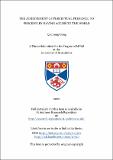Files in this item
The achievement of perceptual presence : to perceive by having access to the world
Item metadata
| dc.contributor.advisor | Wheeler, Michael | |
| dc.contributor.author | Gong, Qianrong | |
| dc.coverage.spatial | 154 | en_US |
| dc.date.accessioned | 2023-03-31T10:10:25Z | |
| dc.date.available | 2023-03-31T10:10:25Z | |
| dc.date.issued | 2022-11-30 | |
| dc.identifier.uri | https://hdl.handle.net/10023/27310 | |
| dc.description.abstract | This dissertation provides an enactive approach to perception. It argues that perceptual presence is achieved by perceivers. They do this by having access to the world through the navigation of sensorimotor contingencies based on their understanding. In developing this view, the dissertation defends a version of the enactive account of perception that is originally proposed by Alva Noë and explores how this account challenges and competes with other accounts of perception, including sense-datum theory, naïve realism, etc. It also argues that Noë’s enactive account is insightful as he acutely captures certain features of perceptual phenomena and so makes plausible challenges towards representationalism about perception. However, he fails to provide a clear and detailed thesis concerning the way we perceive, especially how sensorimotor understanding can help with the grasp of the two-dimensionality of presence, i.e., the fact that we perceive how things look and how they really are at the same time. In order to make the enactive approach a better account, the dissertation provides an improved explanation of the duality of presence. I argue that things are always practically remote for us. Such remoteness is the root of the duality as we have to cope with the remoteness by having access to objects through navigating sensorimotor contingencies. Because presence is achieved in such a way, it has the two-dimensionality feature. The final chapters provide an extended explication of the means to the achievement of access by drawing out the way that sensorimotor understanding is procured through perceivers’ acquiring a sort of practical conceptual knowledge of their perceptual situations. The dissertation thus ends with the argument that concepts are necessary skills for perceivers to achieve sustaining access to the world. | en_US |
| dc.language.iso | en | en_US |
| dc.subject.lcc | B828.45G7 | |
| dc.subject.lcsh | Perception (Philosophy) | en |
| dc.title | The achievement of perceptual presence : to perceive by having access to the world | en_US |
| dc.type | Thesis | en_US |
| dc.type.qualificationlevel | Masters | en_US |
| dc.type.qualificationname | MPhil Master of Philosophy | en_US |
| dc.publisher.institution | The University of St Andrews | en_US |
| dc.publisher.department | The St Andrews and Stirling Graduate programme in Philosophy (SASP) | en_US |
| dc.identifier.doi | https://doi.org/10.17630/sta/381 |
This item appears in the following Collection(s)
Items in the St Andrews Research Repository are protected by copyright, with all rights reserved, unless otherwise indicated.

